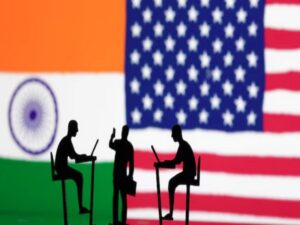‘Sockpuppets’ created puffery about Adani, says Wikipedia
New Delhi, Feb 21 (PTI) For more than a decade, sockpuppets – some of them being company employees – created ‘puffery’ around tycoon Gautam Adani, his family and the apples-to-airport group he helmed by adding non-neutral material and removing warnings from information on Wikipedia, the free internet-based encyclopedia has alleged.
Adani, a first-generation entrepreneur, has lost over USD 70 billion in net worth and slipped to 25th rank on the world billionaire index from being Asia’s richest and the world’s third most wealthy businessman, in less than a month.
This followed US short-seller Hindenburg Research accusing the group of accounting fraud, stock price manipulation and money laundering, allegations that the conglomerate has repeatedly denied, and threatened legal action.
Wikipedia in a February 20 ‘Disinformation Report’ referred to the “con” alleged by Hindenburg, to ask “Did he (Adani) and his employees also try to “con” Wikipedia readers with non-neutral PR versions of related Wikipedia articles?”
It went on to answer the question, “Almost certainly they did.”
“Over 40 later banned or blocked sockpuppets or undeclared paid editors created or revised nine related articles on the Adani family and family businesses. Many of them edited several of the articles and added non-neutral material or puffery,” it said.
Wikipedia is a wiki, meaning anyone can edit nearly any page and improve articles immediately. But the principle it operates on is neutrality.
A sockpuppet is a phony name or identity created by an online user to argue, bully or review products as another person.
Some of edits on Adani were by company employees, Wikipedia alleged listing IP addresses that edited information on Adani, his wife Priti, son Karan, nephew Pranav and the group companies.
Adani Group spokesperson did not respond to an email seeking comments.
Wikipedia said the article or a write-up on Adani was started in 2007 in “a straightforward style” but by 2012 three editors, who were later blocked or banned as sockpuppets or undeclared paid editors, had edited the information on “the philanthropy section, made a few reverts, and removed a warning tax”.
Similar instances were cited for information on family and the group.
“A declared paid editor, using a company IP address, completely rewrote the Adani Group article. Others removed warnings about conflict-of-interest editing. Some created articles by unusual methods that avoided Wikipedia’s quality control systems,” it said.
It however did not provide the exact information that was added by sockpuppets.
“Perhaps the most concerning finding is that Hatchens, an articles for creation reviewer, was banned for abusing his position and possibly corruptly approving several Adani articles. He edited seven of the nine articles examined,” it added.
Adani’s net worth has shrunk to about USD 49 billion from close to USD 120 billion before January 24, and the publicly traded companies he controls have lost over USD 125 billion in market value. He was ranked as the third richest person in the world and is now only ranked as 25th.
On January 24, Hindenburg Research released a report titled ‘Adani Group: How the World’s 3rd Richest Man Is Pulling the Largest Con In Corporate History’. It accused Adani’s companies of “brazen accounting fraud, stock manipulation and money laundering … taking place over the course of decades.”
The group has denied allegations, calling them “malicious”, “baseless” and a “calculated attack on India”.
Wikipedia said billionaires have a history of apparent undeclared paid editing on Wikipedia, including Kenneth C. Griffin (paywall), Robert T. Brockman, Robert F. Smith and several Russian oligarchs. A few near- or former-billionaires including Elizabeth Holmes, Greg Lindberg, Jeffrey Epstein, and Peter Nygard have also appeared to hire people for undeclared paid editing, it said.






